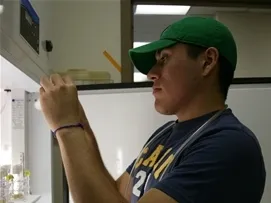Adrian Gonzalez '13 Studies the "Birds and Bees" of Fruit Flies

Observing fruit flies copulating in the rooms of Martin Biological Laboratory is not exactly a common experience for most rising seniors. But for Adrian Gonzalez '13, it's exactkly where he wants to be.
For over 100 years, biologists have studied the genetics of fruit flies and have even uncovered the entire sequence of their genome. Due to the huge body of existing resources on fruit flies, they are ideal subjects for scientists to manipulate almost any genetic, molecular, or cellular process. However, research on the sexual interactions of fruit flies has primarily focused on male courtship behavior, while research on female sexual receptivity has been limited to the role of olfactory neurons.
Gonzalez, a neuroscience major from Chicago, Ill., is enthused to break new ground in this field. His days start early in the lab as he investigates the role of ppk25, a gene that is expressed in gustatory neurons, in recognizing male pheromones and mediating female receptivity to male attempts of copulation. "We're completely deviating from the standard," he says. "It's territory that no on has ever looked at."
Gonzalez's research is part of Professor of Biology Kathleen Siwicki's ongoing study of the courtship behavior and memory of the fruit fly, Drosophila melanogaster. As a neurobiologist, she focuses on the neural mechanisms of learning in fruit flies that display associative learning, also known as courtship conditioning.
In researching pheromone detector neurons, Gonzalez uses "genetic tools" susceptible to changes in temperature to modify the activity of the neuron. By manipulating the activity of the neuron, he mimics the presence of a pheromone.
"I crossed two strains of flies and by doing so, I'm able to get a fly that has TrpA channels, which are heat inducible," he explains. "By making this cross, I was able to localize these channels to the ppk neuron. We're looking at naïve females, which do not have any social interaction with other flies, and how I can 'prime' them by exposing them to male pheromones during different times of their early development."
From scouring videos of hour-long experiments to breeding pupae, Gonzalez designs and operates much of the experiment. Every hour spent on experiments, which are usually conducted twice a week, commands five or six hours of preparation and data collection."Kathy is there to mentor, not micromanage us [students]," he says. "We have to be responsible for looking at the logistics."
According to Gonzalez, such an applied, hands-on experience is not often available to undergraduate students. He remains undaunted and will continue this research over the coming semesters, as his findings will form part of his senior thesis and his Biology 94 Research Project. "It's a really cool opportunity," he says, "because you don't get this experience at bigger universities."
Siwicki believes summer research experiences are critical in forming students' decisions to pursue science careers. "You can't learn science without doing science," she says. "Conducting research over the summer is a great opportunity for students to work full-time in the lab and try the lifestyle."



